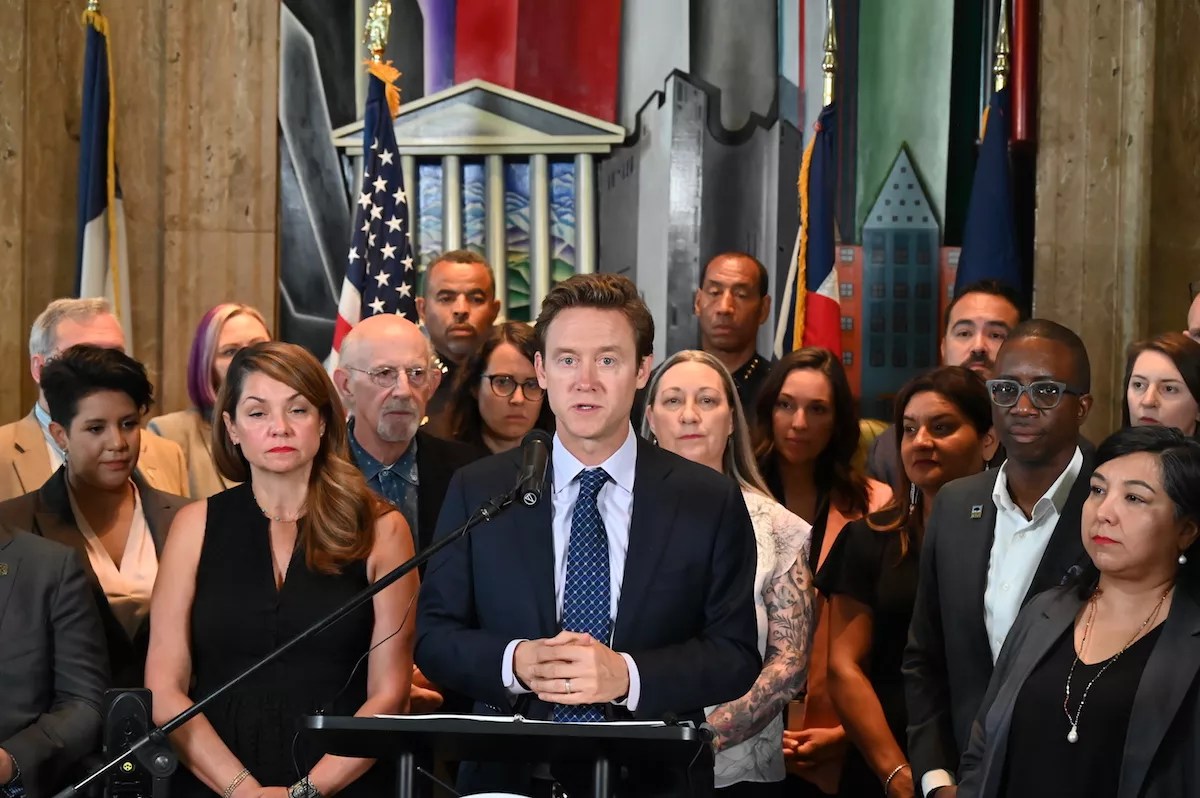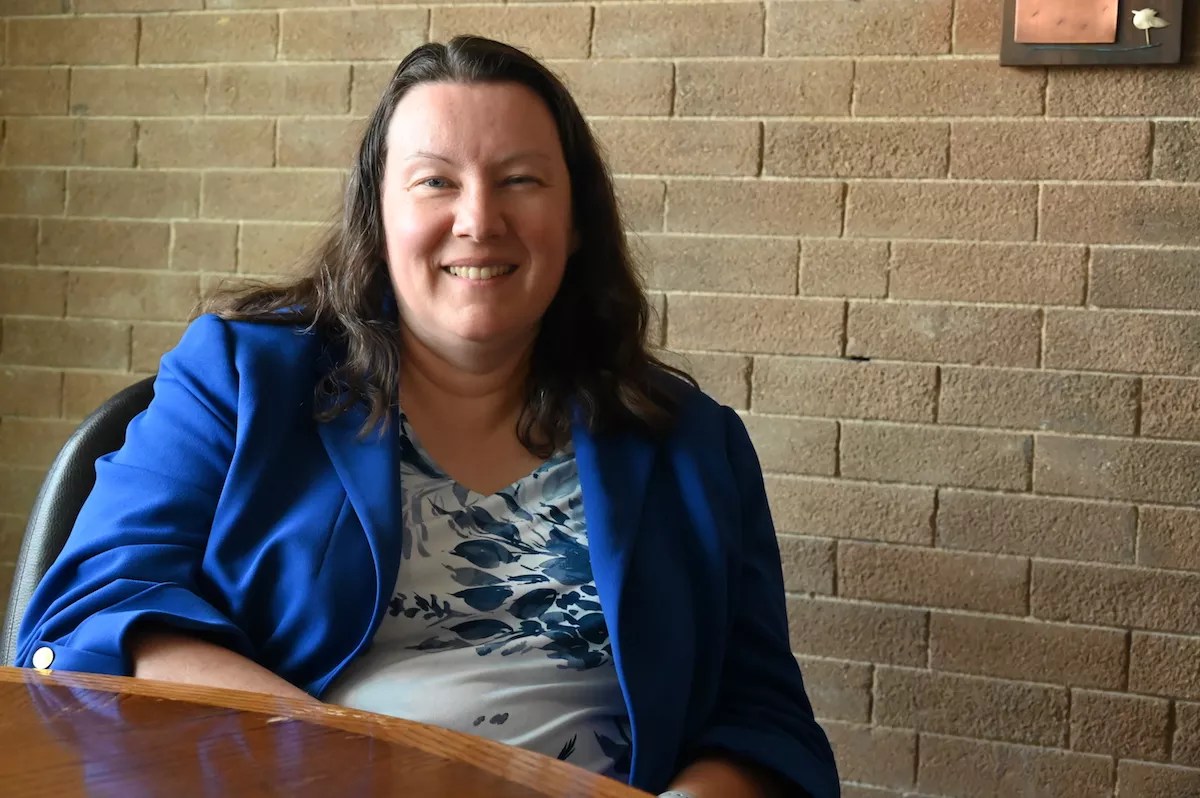
Bennito L. Kelty

Audio By Carbonatix
If the city is going to find housing for a thousand unsheltered homeless people who are “living and dying on the streets of Denver,” Mayor Mike Johnston will be hard-pressed to realize that promise without the Colorado Coalition for the Homeless.
On July 18, his first full day in office, Johnston declared an emergency to help 1,000 people “get indoors” as he works to solve “the most significant issue the city faces right now.”
In his emergency declaration, Johnston also vowed to “expedite permitting and construction timelines for homelessness and affordable housing projects” and “mobilize a broad coalition of Denverites including unhoused people, service providers, city agencies, construction experts, real estate experts, landlords, labor, representatives from the faith community, businesses, and neighborhood groups.”
Last week, Johnston named nine of the ten mayoral appointees who will be in charge of the city’s emergency response to homelessness, with Cole Chandler, the former director of the Colorado Village Collaborative, leaving a state position to head the group; the mayor has yet to name the lead agencies with which Denver will be working.
But the Colorado Coalition for the Homeless will definitely be front and center, and Johnston met with Britta Fisher, the group’s CEO and president, on July 26. The nonprofit’s main job is to “design housing to serve people exiting homelessness and also affordable homes,” says Fisher, who’d helped usher in the city’s Department of Housing Stability, HOST, before taking the helm at CCH.
“We’re a partner, a collaborator and an advocate, frankly, regardless of administration,” Fisher notes. “This is our sixth mayoral administration in these last 39 years that CCH has been here. While we will certainly partner and be there for Johnston, it is also our call and our mission to be there for many mayors, county commissioners and representatives.”
“We’re going to need their help like we’ll need any organization’s help, and we’re open to anybody that wants to be a part of it,” Johnston says of the CCH. “They are one of the large providers, so as we talk about how we scale up providers, we need to find providers that can do that.” His office has been talking with about forty affordable-housing providers, he notes: “We are going to partner with any and all providers that want to provide services.”
And the city will need partners. When Johnston made his emergency declaration, he pointed to the City of Denver’s estimated unsheltered population of 1,313 individuals, the number from the 2022 Point in Time Count, a federally funded annual program that records the number of people living on the street and in shelters across the U.S. during one night in January.
A week later, results of the 2023 Point in Time Count were released; it indicated an 8 percent increase in the number of unsheltered homeless people in Denver – up to 1,432 – and a 32 percent increase in homelessness across the metro area.
CCH has its own way of counting unsheltered homeless, and suggests that to get a more accurate assessment, the Point in Time Count should be multiplied by two and a half to come up with the number of homeless people in the city throughout the year, which would put Denver at almost 5,500 unsheltered homeless.
“Something that’s always going to be an interesting struggle at the city government level, where I was previously, is to decide where do we need to peel back and look at the structure, if we need to fix it and what do we do to house somebody now with the structure that we have,” Fisher says. “That is a hard thing to figure out.”

Britta Fisher went from leading the housing efforts for the City of Denver to leading the Colorado Coalition for the Homeless.
Bennito L. Kelty
Like Johnston, Fisher is new to her job. She was the city’s Chief Housing Officer in 2018 before becoming director of HOST when it was established in 2019. After longtime CCH head John Parvensky retired last summer, she was chosen to take the place of her former boss; she first worked for CCH from 2004 to 2006 as an advocacy and housing program manager, which she says makes her a “boomerang.” She stepped into her current role in March.
“I loved my job and team at the city, and had planned to stay to help transition to the next administration,” Fisher says. “But when John Parvensky announced his retirement, I knew I wanted to go for it and directly support the team doing this work to create lasting solutions to homelessness.”
Having led HOST and now head of CCH, she’s a natural bridge between the city and the nonprofit that Denver has relied on heavily to help with housing and services for the homeless population, spending millions with the nonprofit every year. So far in 2023, HOST has made $6.7 million in payments to CCH for contracted services.
CCH owns eighteen residential properties with more than 2,100 units across the metro area and Colorado. But the services that CCH offers beyond housing are the organization’s “secret sauce,” according to Fisher. More than 21,000 people received some kind of service through CCH in 2022, according to its annual report, including nearly 800 families.
While Johnston says he plans “to get 1,000 people who are currently unhoused access to housing before the end of this calendar year,” it will take more than beds and walls to find a lasting solution, Fisher notes.
“We can’t shelter our way out of homelessness,” she says. “We need more of the lasting solutions, and all the lasting solutions have a foundation of affordable housing, housing stability that can then be flexible to all individual needs.”
The coalition got its start as a health-care provider for the homeless in 1984 after “a group of people wrote a grant and created a clinic, a clinic to help people experiencing homelessness with their health-care needs,” she points out. “The intention started out as health care and quickly shifted to include housing. The pioneers of this organization, including my predecessor, John Parvensky, really found the way to make housing happen, wrap it with services and health care, and that has been a successful combination.”
From an initial annual budget of $100,000 and six employees, CCH has grown to a staff of 750 with a $100 million operating budget for 2023, according to Fisher.
More than 22,000 people visit one of CCH’s seven health-service locations each year for Medicaid-eligible services like checkups for children, behavioral therapy, dental and eye care, physical exams, X-rays, substance-abuse treatment and transgender health care. The Stout Street Health Center alone serves about 15,000 adults and children a year.
“We are still one of the largest health-care providers for people experiencing homelessness in the state of Colorado. We are also one of largest providers of supportive housing in the state of Colorado,” Fisher says. “A lot of that has to do with those clinicians who decided at the very beginning, ‘What we really need is housing. We wish we could prescribe housing.'”
Denver paid CCH nearly $28.8 million for housing and services in 2022 and more than $28 million in 2021. That’s a big bump from seven years ago, when the city paid CCH only about $1.4 million. But in the first year of the pandemic, Denver gave CCH $14 million in contracts, and the amount has only increased since then. Much of that increased funding has been subsidized by federal COVID relief like the American Rescue Plan.
In September, Denver City Council approved sending $5 million in federal COVID relief dollars to CCH to continue operating the La Quinta Inn at 3500 Park Avenue West as an emergency COVID shelter, with 103 rooms for people who tested positive for the virus. CCH had purchased the motel in December 2021 and converted it to the Park Avenue Inn, which was used as an emergency shelter to protect homeless people at high risk from COVID.
On July 24, council voted to pay $3 million to CCH to operate the Park Avenue Inn as a non-congregate shelter with related services until August 2025. After that, CCH plans to convert the hotel to 300 units of supportive housing for long-term residence. “Approval of the contract to continue to operate Park Ave Inn as a non-congregate shelter is one concrete step we have taken to provide a safe space for people exiting the cycle of homelessness before they move on to a longer-term housing option,” says CCH spokesperson Cathy Alderman.
In March, the city council unanimously approved a $6 million contract, also funded with COVID relief dollars, to keep CCH as the city’s “lead agency for a rehousing collaborative” responsible for connecting residents to “short-term bridge shelter, rehousing rental assistance and other supportive services, citywide,” according to the contract, which notes that CCH has held that “lead agency” role continuously since at least 2020.
Council unanimously approved a contract in April worth about $5.8 million to have CCH coordinate outreach efforts aimed at Denver’s homeless and their encampments.
Then in late June, council approved a $10.4 million contract for CCH to convert the former Clarion Hotel at 200 West 48th Avenue into Renewal Village, with 215 units of income-restricted housing, half of which would come with wrap-around services.
Fisher attributes some of CCH’s success with these housing projects to CCH Property Management, formerly known as the Renaissance Property Management Cooperation. Having its own property management department handle the properties it owns and operates allows CCH to keep people housed when “there’s a lack of payment, maybe there’s behavioral issues, or something that’s impacting the property,” she says, adding that while “most landlords would use a pretty heavy tool like eviction if they couldn’t work it out,” CCH has personnel tasked with resolving such things and keeping people inside.
“We have a whole system that has resident services and case management and folks working to keep a person housed,” she says. “And that property management company is our own, so we are able to hold both realities and try to work it out to keep as many people housed as possible.”
About 94 percent of the people who are housed for the first time with CCH stay housed after that initial year off the streets, CCH estimates. Much of that comes from helping people with the cost of housing. Using housing vouchers, tax credits and government contracts, for example, CCH is able to offer units in downtown Denver for as low as $345 a month to people who qualify.
But that affordable housing comes with a price, some residents say: crime.

The view looking towards Denver from the Renaissance Riverfront Lofts.
Bennito L. Kelty
The same week that Fisher took office as the new head of CCH, 54-year-old Patrick Lane was killed in his apartment at Renaissance Riverfront Lofts, a CCH property at 3440 Park Avenue West that won state and national awards soon after it opened. The agency’s first “green” apartment building, it’s been recognized for its eco-friendly construction and design, as well as its contributions to the community.
Over the past three years, the Denver Police Department has received 120 calls for trespassing or unwanted persons and 32 calls for theft or robbery at the building. It ranks seventh in calls for police service among locations in District 1, which includes most of north Denver and areas along West Colfax Avenue.
Many of the trespassing cases “were handled by building security, were roommate conflicts, or unfounded,” and many of the calls for theft or robbery “included roommates or known people stealing from each other,” according to the DPD. Lane was allegedly murdered by 22-year-old Erin Liljander, who lived in a homeless camp near the Globeville area and had visited him before.
The murder was “an extraordinary circumstance,” Alderman says. “We’re not used to having those kinds of tragedies happen in our buildings, because we do provide security and do what we can to respond to the residents’ safety concerns. We believe our properties are safe places to live.”
Some residents of the Renaissance Riverfront Lofts disagree, and complained about conditions there after Lane was killed on March 22. “There’s always things to improve, and we work on that every day as a team and in partnership with our residents,” Fisher says. “If we don’t learn from incidents, then we risk repeating them.”
CCH isn’t the only group buying properties with an eye to housing the homeless. On July 28, the city announced that the Denver Housing Authority board of commissioners has approved the purchase of the 194-unit Best Western Central Park hotel at 4595 Quebec Street for conversion to permanent supportive housing. If council approves the deal, the $25.95 million purchase will be covered by approximately $11 million from the DHA Delivers for Denver (D3) bond funds, as well as $16 million in American Rescue Plan Act funds.
“Unsheltered homelessness is an emergency situation in Denver, and we are laser-focused on bringing 1,000 people safely inside while permanently decommissioning encampments by the end of 2023,” Johnston said in announcing the deal. “This acquisition is the first key piece of that puzzle and puts us on a solid path to achieving our goal, connecting our unhoused neighbors to housing and low-barrier shelter, and improving quality of life in neighborhoods across our city.”
As the City of Denver and officials in surrounding municipalities expand their efforts to end homelessness, Fisher says she expects to see CCH continue to add properties across the state to its portfolio and bring in more partners that can open affordable-housing units. “We will continue to be a partner, advocate and collaborator with the City and County of Denver,” she says.
“The mission, the commitment to preventing and resolving homelessness and building stronger communities never changes, even if the administration does,” she adds.
Fisher says her goal for CCH is ” to make the best better,” a line she borrowed from her time in 4-H when she was growing up in Minnesota. “We’re here 39 years into the Colorado Coalition for the Homeless, and it is an organization with such a powerful mission,” Fisher notes. “For me, it’s taking what we already have that’s so good and making it better.”
For CCH, she concludes, that means “more Colorado, more collaboration, and more community.”